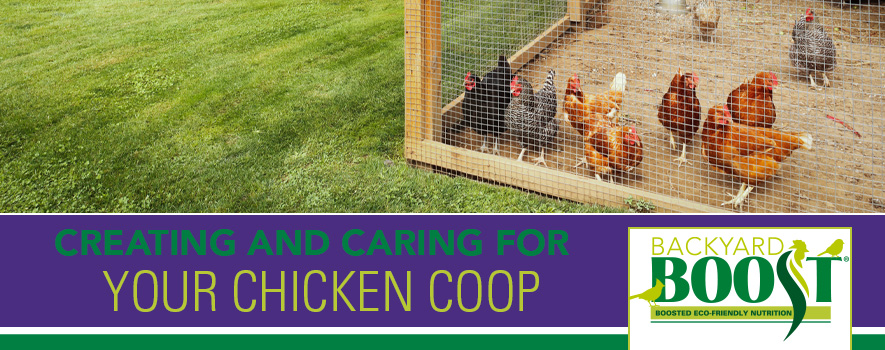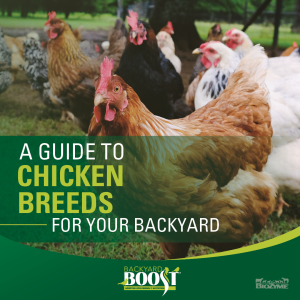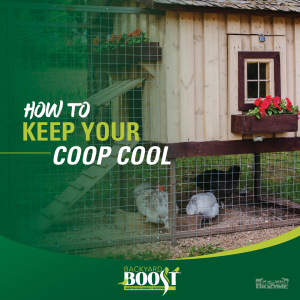
Home sweet home. You’ve purchased your backyard chickens. Now, they need a home of their own or a coop they can call their home. Coops provide shelter from the weather and its extreme elements and protection from predators. There are several considerations to securing a coop for your birds, and we’ll explore them here.
Spacious Living
Just how much room does a chicken need? A chicken needs about 4 square-feet per bird inside the coop. That means a 10×10 coop would comfortably hold 25 birds.
(10 x 10 = 100 feet / 4 feet = 25 chickens)
Remember, they also need about 10-12 inches per bird to roost on at night. Wood is recommended for roosting, so they have a good grip and don’t slip. Finally, you will want to have enough room to have adequate nesting boxes for laying eggs. Figure on about 4 hens per box for laying eggs in.
Build or Buy?
Your resource bank of time, tools and talent will help you determine if you build your own coop or buy a ready-made or easy-to-assemble coop. However, the first thing you need to do is check with your city ordinances or home-owners association for any regulations on structures in your backyard. If there are no regulations, you are set. If there are regulations, be sure to follow them.
Building gives you the satisfaction of making a coop to your specifications and knowing that you put your own sweat equity in your beautiful birds’ home. However, you also need to consider if you have time and tools needed, the skills required and the financial wherewithal. Lumber prices have skyrocketed in the past two years, and building materials cost more now than ever. If you are not sure you have the proper tools or the time to construct your own coop, buying a coop is a wise alternative.
There are multiple outlets where you can purchase a brand-new chicken coop. Most farm stores have several coop options to choose from, and if not readily assembled they can do so for a minimal fee. Some lumberyards also build chicken coops to sell, as do 4-H and FFA members looking for the building and marketing experience, if you have time to look around. In addition, we’ve provided a list of places where you can buy chicken coops, sourced from www.hobbyfarm.com:
- AmishCoops.com: www.amishcoops.com
- Carolina Coops: www.carolinacoops.com
- CC ONLY: www.cconly.com
- The Chicken Coop Co.: www.chickencoopcompany.com
- Chicken Saloon: www.chickensaloon.com
- EZ Fit Sheds: www.ezfitsheds.com
- Lancaster Chicken Coops: www.lancasterchickencoops.com
- My Pet Chicken: www.mypetchicken.com
- Omlet: www.omlet.us
- Quail Manufacturing: www.eggcartn.com
- Snap Lock Chicken Coops: www.snaplockchickencoops.com
- Urban Coop Co.: www.urbancoopcompany.com
Although you might find used chicken coops for sale on a local marketplace, be cautious about purchasing a used coop, for fear of disease transmission. Unless you trust the seller will totally clean and disinfect the coop before it is transported to your property, you are likely better off buying a new coop to keep diseases away from your chickens early on.
Keep it Clean
Chickens can be messy but are not as messy as ducks or other birds. Depending on what you have as flooring of your coop will determine how often you need to tidy up the coop. If it is a dirt floor, just “picking” any wet or nasty waste should be done weekly; otherwise, it will decompose into the soil. If you have a wooden or plastic floor with shavings, you will want to “pick” waste and shavings and rebed weekly.
You will want to check the roosting bar and knock off any feces from it during your weekly cleaning. Also, make sure the nesting boxes are free from any waste or cracked egg remains or shells. Provide them with fresh bedding as needed.
Many backyard bird enthusiasts recommend a deep cleaning of the coop once or twice a year – once before you get new chicks in the spring and once again in the fall. Deep cleanings can involve hosing down or power washing, using a safe cleaner or disinfectant and making sure all boxes, roosting bars, doors and hinges are in proper working order.
Dining In or Going Out?
There seems to be some mixed opinions about keeping feed and water in the coop or not. Many say the coop is their home, and chickens deserve to have their food and water readily accessible; however, the coop should be used predominately for roosting (sleeping) and laying. The chickens should remain outside the rest of their day, and therefore the food and water should be left outside, in their run, as well. The exception would be during inclement weather, when the water might freeze or during rain when the food could get wet and mold.
Keeping the food and water in the coop promotes the chickens being in the coop, which leads to a larger mess inside for you to clean up. The food could also attract mice and rats, both which carry disease. Water can easily spill, making a mess and adding to the cleanup and cost of bedding. Chickens are typically sleeping at night, so if you lock them in their coop to protect them from predators, they will be sleeping, not eating. You’ve got your chickens. You’ve provided them a cozy home, and now you’re keeping it clean. Give your chickens the home sweet home they deserve to keep them safe from predators and protected from nature’s elements. They will thank you.

